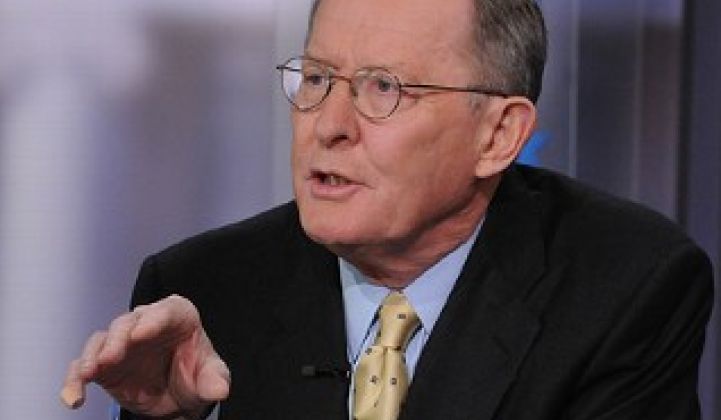In a speech yesterday at the Oak Ridge National Laboratory, Senator Lamar Alexander (R-TN) lauded distributed solar power, called for more R&D funding of clean technologies, and warned that humans are causing climate change.
The speech was a notable departure from recent GOP rhetoric on clean energy, which has been largely focused on playing up a handful of high-profile bankruptcies and questioning the validity of climate science.
Senator Alexander plays an influential role in Washington when it comes to energy policy. As the ranking member of the Subcommittee on Energy and Water Development, he helps guide how the Department of Energy is funded. The Senator is a major proponent of R&D spending on both cleantech and fossil fuels. He is also very outspoken about energy tax subsidies and commonly uses the term "big wind" in his efforts to repeal the production tax credit for wind.
Alexander's speech covered many familiar talking points. He worried about the cost of state-level targets for renewable electricity, criticized the government for trying to "pick winners and losers," and called for eliminating the wind tax credit in favor of more R&D spending.
However, his speech also included a few "maverick" comments that break from current GOP thinking on energy.
Early on in his remarks, Alexander commented on the need to develop low-carbon energy in order to address climate change.
"While the United States has made more gains in reducing the use of carbon than any other industrial country, the National Academies of the U.S. and twelve other countries have warned that human activity has contributed significantly to climate change and global warming," he said. Alexander then went on to criticize cap-and-trade legislation.
Alexander also criticized state targets for renewable energy, warning they would put "too much reliance on sources that generate power only intermittently" and take up too much land area. However, he pivoted quickly to his support for distributed solar, which he said shows "great promise."
"There certainly is a place for these renewable technologies, and solar power especially seems to me to have great promise," said Alexander. "Fortunately, we have plenty of rooftops on which to put solar panels. And when they become cheap enough and aesthetically pleasing enough, they will probably become an increasingly important supplement to our country’s huge appetite for electricity -- especially because the sun shines during the peak use hours."
Throughout last year's election season, GOP leaders and party allies made solar and other clean technologies a top target in their campaign to unseat President Obama.
Last spring, groups spent more than $10 million on Solyndra attack ads in one month. In July, the party rolled out an interactive website touting debunked claims that Obama's investments in renewable energy and electric vehicles were outsourcing jobs overseas. And Republican challenger Mitt Romney called Tesla (which recently paid back its loan guarantee) a "failure," while also proclaiming that federal loan programs were hurting investment in solar.
So does this speech mark a change in tone from the GOP?
In a speech five years ago, Senator Alexander called for more investment in electric vehicles, solar, biofuels and green buildings. Given his past support of such initiatives, Alexander's latest speech isn't a dramatic shift for the Senator.
But some Republicans are watching closely to see how it influences others in the party. Michael McKenna, a GOP energy lobbyist, told National Journal that Alexander's remarks are important for Republican leaders as they consider shifting their platform in the 2016 election cycle.
"Lamar is a pretty interesting guy. Given his swingy nature, lots of people are going to pay attention to what he is saying," McKenna said.
The political divide between liberals and conservatives over specific policies like tax credits and cap-and-trade may not close anytime soon. But if Alexander's speech is any indication, Republicans could try to swing back to the center and take up more moderate policy positions like they promoted in the 2008 election, when "climate change" and "renewable energy" were not dirty words.



